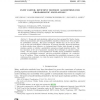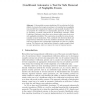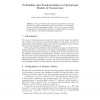125
click to vote
VMCAI
2012
Springer
13 years 9 months ago
2012
Springer
Abstract. Recently, a general framework on characteristic formulae was proposed by Aceto et al. It offers a simple theory that allows one to easily obtain characteristic formulae o...
158
click to vote
CONCUR
2011
Springer
14 years 2 months ago
2011
Springer
Probabilistic nondeterministic processes are commonly modeled as probabilistic LTSs (PLTSs, a.k.a. probabilistic automata). A number of logical characterizations of the main behavi...
136
click to vote
CORR
2011
Springer
14 years 9 months ago
2011
Springer
The value 1 problem is a decision problem for probabilistic automata on finite words: given a probabilistic automaton A, are there words accepted by A with probability arbitraril...
108
click to vote
IJFCS
2008
15 years 2 months ago
2008
We consider the equivalence problem for labeled Markov chains (LMCs), where each state is labeled with an observation. Two LMCs are equivalent if every finite sequence of observat...
101
click to vote
CORR
2008
Springer
15 years 2 months ago
2008
Springer
Strong and weak simulation relations have been proposed for Markov chains, while strong simulation and strong probabilistic simulation relations have been proposed for probabilisti...
130
click to vote
CONCUR
2010
Springer
15 years 2 months ago
2010
Springer
Abstract. Polynomially accurate simulations [19] are relations for Probabilistic Automata that require transitions to be matched up to negligible sets provided that computation len...
108
click to vote
CONCUR
2006
Springer
15 years 6 months ago
2006
Springer
We give a brief overview of operational models for concurrent systems that exhibit probabilistic behavior, focussing on the interplay between probability and nondeterminism. Our su...
108
click to vote
ICALP
2010
Springer
15 years 7 months ago
2010
Springer
Abstract. This paper tackles three algorithmic problems for probabilistic automata on finite words: the Emptiness Problem, the Isolation Problem and the Value 1 Problem. The Empti...
CONCUR
2003
Springer
15 years 7 months ago
2003
Springer
We establish that on the domain of probabilistic automata, the trace distribution precongruence coincides with the simulation preorder.
113
click to vote
VOSS
2004
Springer
15 years 7 months ago
2004
Springer
We survey various notions of probabilistic automata and probabilistic bisimulation, accumulating in an expressiveness hierarchy of probabilistic system types. The aim of this paper...



